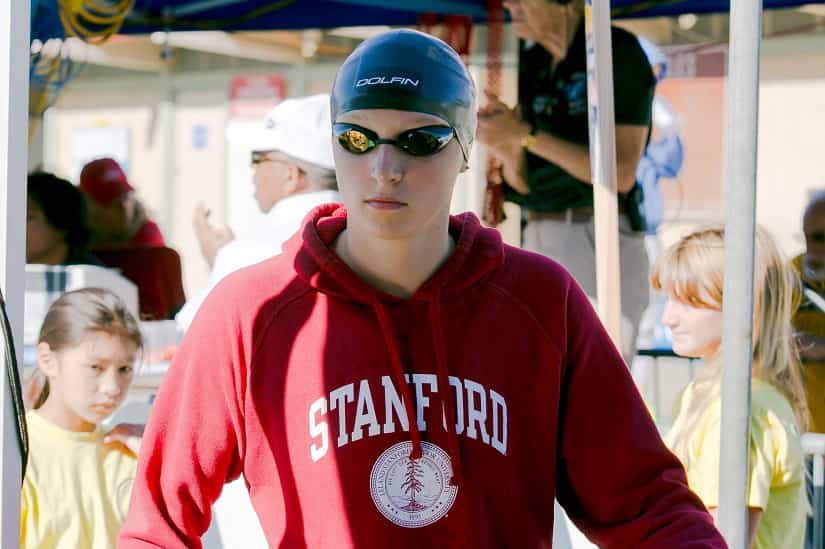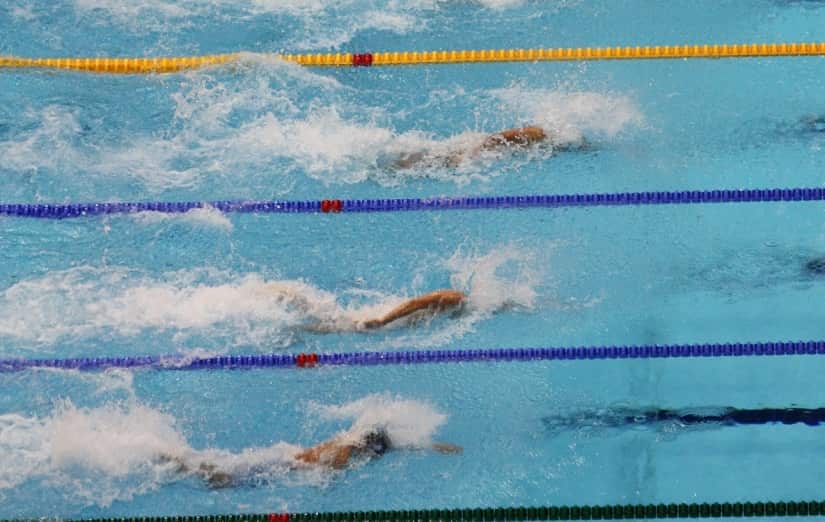“Whatever,” I grumbled under my breath, looking at the last set on the soaked piece of paper stuck to the kickboard at the end of my lane.
My workout was mostly done, but I was exhausted and I was over it.
The rest of the warm-down could suck it, as far as I was concerned.
I’m done.
I slid out of the pool, took about thirty seconds to fully stand up, and went to the hot tub and with feet dangling in the bubbling, hot water, stared blankly off into the distance for somewhere between five and twenty minutes.
I was having a classic “Ah, screw it” moment where fatigue and frustration was (easily) overwhelming what I was supposed to be doing.
Even though I had done the main set, and the pre-set, and the second main set, I didn’t feel good.
Quite the opposite…
I was so tired that I felt cranky and crabby. If there were endorphins (the “feel good” hormones from working out) pumping through my veins, they were being drowned out by the sheer fatigue I was feeling.
The rest of the day I was down mentally.
Doubtful of myself…
Of my goals in the pool…
It’s not that I wanted to quit, but I certainly didn’t feel good.
So what gives?
Hard Training in the Pool Makes Us Real Grumpy
As it turns out, this reaction is typical when our training escalates.
Researchers took a group of 12 male swimmers and doubled their daily training output from 4,000m to 9,000m for a period of ten days. The yardage was also done at a high intensity (not just straight, slow swimming, in other words). As you would expect, muscle soreness and fatigue skyrocketed. No surprise there.
But so did feelings of anger, depression, along with a reduction in general sense of well-being.
Another study, this time with nearly two hundred NCAA swimmers, evaluated mood responses over a four-year period, surveying the swimmers at varying points of each season.
Quelle surprise: the swimmers mood was connected to how much training and yardage was being done in the pool. Depression, anger and confusion was far more common during stretches where training was really hard.
With the exception of tension, which remained constant, the moods of the swimmers was tied to the up and down in training distance.
In both studies, mood profiles returned to normal when the mileage dropped and the swimmers began to taper for competition. While sucky, the Negative Nelly feelings weren’t long lasting and didn’t persist once the yardage began to drop.
(No wonder swimmers go positively ape when it comes to tapering, hey?)
How to Get Through the Rage Plateau
I’m gonna go ahead and trademark this—the Rage Plateau—the spate of training where we are a certified pouty-face and general menace to the world around us.
Maybe just knowing that this drop in mood is typical of this kind of elevated training—and therefore “normal”—is enough to help you get through it and avoid making any snap decisions based on el rage.
Beyond that, there are some things you can do to better survive this chunk of training so that you not only come out a faster swimmer on the other side, but avoid driving the people around you bananas with your grumble-grumble-grumbling.
Here are a handful of my top picks for surviving and possibly even thriving through your own Rage Plateau:
Keep a gratitude list.
When it comes to cost-to-benefit, this one is an easy winner. It takes about three minutes to do (even with a brain that’s been depleted from crushing 12,000m that day) and can be done anywhere.
Before you go to bed, or when you wake up, or in the middle of the day when you are stressing about the PM workout that is likely to hand you your own butt, write out 3-5 things you are grateful for.
The benefits of gratitude have shown themselves repeatedly in studies to decrease stress and even help us sleep better. Katie Ledecky even kept a gratitude list in the pages of her training journal.
Prepare for those stretches of training the best you can.
Recovering from a brutal workout is hard enough, but juggling other commitments like schoolwork, our social life (hahahaha) and/or work makes it even harder.
If you know there is a massive block of training coming up, get ahead of it. Plan for it. Be proactive to the busyness and stress to come instead of merely reacting to it.
You don’t need the frustration and anger that naturally arises from really hard training to infect the rest of your life’s decisions and opportunities.
Get all the sleep.
One of the most underrated benefits of getting lots and lots of sleep—and there are plenty of benefits—is improved cognitive function and mood.
Which, when you combine the two, makes you more pleasant to be around and makes you mentally tougher. The latter will come in handy when you are neck-deep in a tough set and the thought of quitting is tickling your brain.
Yeah, yeah, I know—your schedule is already packed solid. But literally every area of your life will be impacted by you choosing to make the time to get more sleep, including the pool.
What’s next?
You want a simple trick for more mental toughness? Focus only the next workout. Just tomorrow (or today). Not the day after, not the whole week, and not the whole training cycle.
I’m sitting here writing this on a Wednesday afternoon. I still have three more days (featuring five more workouts) to complete this week, and today was the easy/recovery day. Thinking about all that training doesn’t give me a lot of hope.
In fact, it gives me a USDA-certified sense of FML. It makes me wonder how much worse I am going to feel over the coming days, which is, to be honest, deflating.
Instead, focus on what’s next. Nothing beyond that. The next workout. The next set. The next lap.
More Stuff Like This:
This New Mental Training Book Will Help You Swim Like a Rock Star This Season. Ready to take your swimming to the next level? Learn more about our awesome mental training book that will help you rock out with your socks out, whether it’s in practice or competition.
10 Things That Have Nothing to Do with Talent. Much is made about having lots of talent. But talent alone doesn’t make champion swimmers. And it’s something you also don’t control. Here’s what to focus on instead.
How Swimmers Can Develop World-Class Resilience. Grit, mental toughness, fortitude—whatever we’re calling it this week, is essential to your swimming success. Here’s why resilience is the difference maker you’ve been looking for in the pool.















